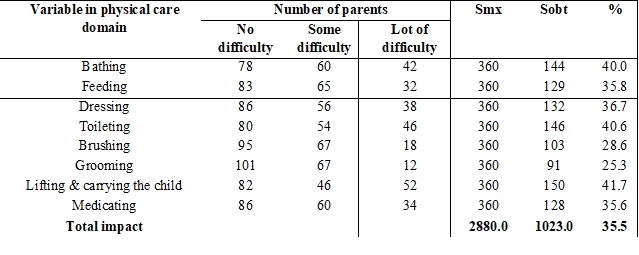A study of the disability impact among parents of mentally challenged children
Abstract
Back ground: The child with mental retardation has special needs in addition to the regular needs of all children, and parents can find themselves over whelmed by various medical, care giving, financial and educational responsibilities. Government of India, “The National Policy on Mental Handicap”, has emphasized the importance of home-based care with parents as partners in the care process.
Aim: To understand the positive and negative effects on parents of Mentally Retarded children by using National Institute for the Mentally Handicapped Disability Impact Scale (NIMH-DIS).
Material and methods:Two intelligence tests [Vineland Social Maturity Scale (VSMS) and Developmental Screening Test (DST)] have been selected.Study sample is selected by purposive sampling method and categorized into three groups.
Results: Parents of Mentally retarded children are impacted more by lifting & carrying the child (percentage of obtained score = 41.7), toileting (percentage ofobtained score = 40.6) and bathing (percentage of obtained score = 40). Maximum negative impact is on physical care (percentage of NIMH-DIS score = 35.5), followed by financial (percentage of NIMH-DIS score = 33.9) and loss of support (percentage of NIMH-DIS score = 33).
Conclusion: It is not necessary for every parent having a Mental Retardation child to have negative impact but in some this can bring a positive impact, like acceptance of the situation realistically and standing right behind the Mental Retardation child to provide support.
Downloads
References
2. ZUK GH. The religous factor and the role of guilt in parental acceptance of the retarded child. Am J MentDefic. 1959 Jul;64(1):139-47.[pubmed]
3. Brust JD, Leonard BJ, Sielaff BH. Maternal time and the care of disabled children.Public Health Nurs. 1992 Sep;9(3):177-84.[pubmed]
4. Gathwala.G, Gupta. S. family burden in Mentally Handicapped children. Indian Journal of community medicine 2004;vol 24No.4.
5. Booth CL, Kelly JF.Child care and employment in relation to infants' disabilities and risk factors. American Journal of Mental Retardation. 1999;March; 104(2):117-30.[pubmed]
6. Marji Erickson Warfield. Employment, Parenting, and Well-Being Among Mothers of Children With Disabilities Retardation2000;Vol. 39, No. 4, pp.297–309.
7. Warfield ME. Employment, parenting, and well-being among mothers of children with disabilities.Ment Retard. 2001 Aug;39(4):297-309. doi:10.1352/0047-6765(2001)039<0297:EPAWBA>2.0.CO;2[pubmed]
8. Samuel Bauman. Parents of children with mental retardation: coping mechanisms and support needs. Dissertation submitted to the Faculty of the Graduate School of the University of Maryland, College Park in partial fulfillment of the requirements for the degree of Doctor of Philosophy 2004.
9. Seiquira, E.M., Rao, P.M., Subbu Krishna, D.K. &Prabhu G.G. Perceived burden and coping styles of the mothers of mentally handicapped. NIMHANS journal,1990;8(1).
10. Farber, B. Effects of a severely mentally retarded child of family integration. Monographs of the Society for Research in Child Development, 1959;24, (2, Serial No.71).
11. Datta SS, Russel PS, Gopalakrishna SC. Burden among the caregivers of children with intellectual disability: Associated risk factors. JIntellect Disab2002;6:337-50.
12. Nancy, G. Attitudes of parents towards their mentally retarded children: A rural area examination (master thesis). Department of Psychology University of Zululand 2002;1-68. Available from:http://uzspace.uzulu.ac.za/handle/10530/220.
13. Gohel M., Mukherjee S., Choudhary S.K. Psychosocial impact on the Parents of mentally retarded children in Anand District, health line, 2011;Vol.2,p.62-66.
14. Majumdar M, Da Silva Pereira Y, Fernandes J. Stress and anxiety in parents of mentally retarded children. Indian J Psychiatry. 2005 Jul;47(3):144-7. doi: 10.4103/0019-5545.55937.[pubmed]
15. Kazak AE and Marvin RS. Stress and social networks in families with a handicapped child. Fam Relat 1985; 33:67-77.
16. Flaherty, E.M., & Glidden, L.M. Positive adjustment in parents rearing children with Down syndrome. Early Education and Development, 2000;11,407-422.
17. Rastogi CK. Attitude of parents towards their mentally retarded children. Indian J Psychiatry. 1981 Jul;23(3):206-9.[pubmed]
18. Burr, W.R., Klein, S.R., Burr, R.G., Doxey, C., Harker, B., Holman, T.B., Martin, P.H., McClure, R.L., Parrish, S.W., Stuart, D.A., Taylor, A.C., & White, M.S. (1994). Reexamining family stress. Thousand Oaks, CA: Sage Publications,Inc.
19. Heller, T., Hsieh, K., Rowitz, L. Maternal and Paternal care giving of persons with mental retardation across the life span. Family relations, 1997;46 (4),407-115.
20. Upadhyaya, G.R. and Havalappanavar, N.B. Stress in Parents of the Mentally Challenged, Journal of the Indian Academy of Applied Psychology 2008; 24,53-59.

Copyright (c) 2018 Author (s). Published by Siddharth Health Research and Social Welfare Society

This work is licensed under a Creative Commons Attribution 4.0 International License.


 OAI - Open Archives Initiative
OAI - Open Archives Initiative


